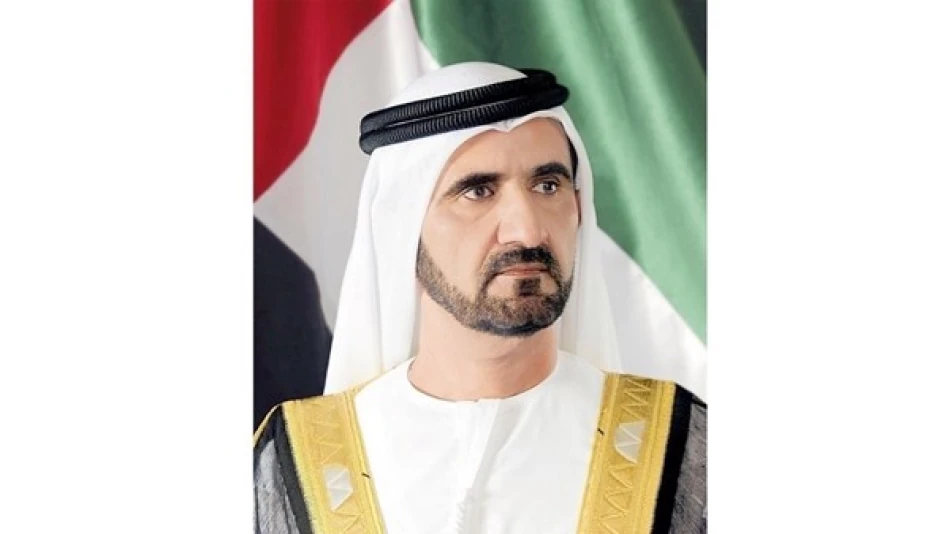
Dubai's Housing Authority Delivers AED 1.725 Billion in Residential Assistance Under Royal Directives
Dubai Accelerates Citizen Housing Support with $470 Million Investment in First Half of 2025
Dubai's Mohammed bin Rashid Housing Establishment has delivered over 3,000 housing facilities worth 1.725 billion dirhams ($470 million) in the first six months of 2025, marking an aggressive push to strengthen family stability and social welfare for Emirati citizens. The comprehensive housing package reflects Dubai's strategic commitment to maintaining its competitive edge in quality of life as regional economic competition intensifies.
Breaking Down Dubai's Housing Investment Strategy
The housing initiative encompasses three distinct support mechanisms designed to address different citizen needs. The largest component includes 1,390 housing facilities valued at 1.184 billion dirhams, specifically targeting construction, maintenance, and home purchases. Additionally, 935 housing grants worth 540.3 million dirhams cover similar categories, while 695 residential land grants complete the integrated support system.
This multi-tiered approach demonstrates Dubai's sophisticated understanding of housing market dynamics, where citizens face varying financial circumstances and housing preferences. By offering both facilities and grants alongside land allocation, the emirate creates multiple pathways to homeownership.
Strategic Alignment with Dubai's Long-term Vision
Urban Planning Integration
Mohammed Hassan Al Shehi, Acting Executive Director of the Mohammed bin Rashid Housing Establishment, emphasized that these achievements align directly with Dubai Urban Plan 2040 and Dubai Social Agenda D33. This integration suggests housing policy isn't operating in isolation but serves as a cornerstone of broader urban development strategy.
The connection to Dubai 2040 is particularly significant, as the plan envisions accommodating 5.8 million residents by 2040—nearly doubling the current population. Ensuring adequate housing for citizens becomes critical when rapid population growth could otherwise price out locals from desirable areas.
Economic Competitiveness Through Social Stability
Dubai's housing investment reflects a calculated economic strategy. By ensuring citizens maintain strong housing security, the emirate preserves social cohesion while attracting international talent and investment. This approach mirrors successful models in Singapore, where robust public housing maintains social stability alongside rapid economic growth.
Regional Context and Market Implications
The substantial housing investment comes as Gulf states increasingly compete for talent and capital in a post-oil economic transition. Saudi Arabia's NEOM project and Qatar's National Vision 2030 create regional pressure for Dubai to maintain its lifestyle advantages.
For real estate investors, Dubai's citizen housing support could indicate broader market confidence. When governments invest heavily in residential infrastructure, it typically signals expectations of sustained population and economic growth. The 1.725 billion dirham investment also demonstrates fiscal capacity, potentially reassuring international investors about Dubai's financial stability.
Implementation Excellence and Future Outlook
The rapid delivery of over 3,000 housing solutions in six months showcases Dubai's administrative efficiency—a key competitive advantage in attracting business and residents. This execution speed contrasts favorably with housing programs in other major cities, where bureaucratic delays often frustrate beneficiaries.
The emphasis on "flexible and comprehensive housing systems" suggests Dubai is building adaptive capacity for future housing challenges. As remote work reshapes residential preferences and climate considerations influence construction standards, flexible housing policies become increasingly valuable.
Dubai's housing initiative represents more than social welfare—it's a strategic investment in long-term competitiveness. By ensuring citizens maintain housing security amid rapid growth, Dubai preserves the social stability that underpins its economic success while positioning itself for continued regional leadership in quality of life.
Most Viewed News

 Layla Al Mansoori
Layla Al Mansoori






